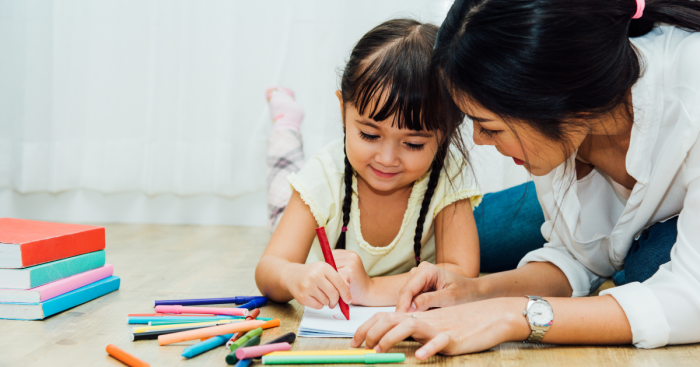Hobbies add a spark of excitement and enrichment into a child’s life. Of all the routines that surround him in his daily life, he finds a niche that piques his interest and offers a different perspective on things. It could be playing a musical instrument, it could be painting or craft work, or crocheting or dancing or swimming or playing football or even cooking but he’s putting his energy, his creativity and expression and focus on to this hobby.
Having a hobby not only helps children discover the world they live in, they also discover themselves such as what they like and enjoy doing. They discover what they are instinctively drawn to – be it the performance arts or sports or reading books and writing – and what they are capable of achieving, as they begin to discover their sense of self, self-concept and self-awareness.
Being Aware of Self
Children do not have self-awareness when they are born. They only begin to realise they are an individual during the ages of one to three years old when they start to know their own name and realise they are looking at themselves when they look in the mirror.
By the age of three to five, when they develop a concept of self or self-concept which is defined as having an image or set of beliefs about oneself, they may describe themselves using very specific and concrete terms such as, “I am three years old, I have a cat.”
As children grow up and mature, they begin using these beliefs and desires to determine behaviour and by the time they enter formal schooling, they become able to use competencies to describe themselves, like “I can dance. I am good at it.”
For a developing child, this self-realization is very important. It is a sign of their growing maturity and awareness of their individuality.
Hobbies are Good for Mental and Physical Health

Studies conducted by experts in the US say that pleasurable activities have psychological benefits and are associated with good health. They found data that supports the idea that hobbies are excellent for improving the psychological and physical state of children and adults.
Hobbies are recreational yet educational. It gives the mind and body that much-needed stimulation while whetting the child’s appetite to find out more. This helps them focus, learn, practice and perfect his interests. The better he gets at his chosen activity, the better he builds his confidence and self-esteem.
Hobbies Help Children Do Well in School
Having a hobby also helps children develop skills that are important for school and studies. Hobbies teach organisational skills, problem-solving skills, decision-making skills, critical thinking skills, time-management skills, goal achievement skills, concentration, creativity, self-expression, patience, perseverance and memory. All these apply to doing well academically too.
Through his hobby, the child will be more inclined to participate in related school activities such as joining the athletics club or martial arts club or chess club or debate team or writing for the school newsletter.
Many children are interested in dinosaurs. A child who is interested in prehistoric life and timelines will learn about earth science, ecosystems and evolution. Learning about dinosaurs will improve his linguistic skills too because many dinosaur names and prehistoric periods are difficult to spell, pronounce and understand. Their interest in this area will trigger an interest in other science subjects too like geology, botany, biology, zoology, ecology and of course, paleontology, not to mention spark his imagination and curiosity about “other worlds” that once were but are not in existence in his reality now.
Using imagination is important for child development. The education advocacy group Bright Horizons states: “Imagination fosters cognitive and social development.”
Research has also shown that children with an “intense interest” in dinosaurs or other subjects have a higher intelligence level. The research suggests that the child’s level of interest can lead to enhanced perseverance, improved attention, and complex thinking such as the processing of complicated information.
If the child’s interest persists until later in life, it can even set the course for his lifepath as hobbies can turn into a lifelong passion and even careers.
As Confucious once said: “Choose a job you love and you will never have to work a day in your life.” It implies that by following a career path that aligns with your interests and passion such as a hobby, you will find better fulfilment, happiness and productivity at the job and it will never seem like work at all.
Aside from helping children excel in school, here are eight more reasons why hobbies are important for children’s development.
8 Benefits of Hobbies for Children

1: A Hobby can Shape his Character
Every child has his or her own unique personality. It is partially influenced by genetics but it is also shaped by the people around him such as his parents and his surroundings. He may have inherited talents, he may even be a genius but if he is not given the chance to develop these talents or interests through skill development, then all that talent or genius will go to waste.
Thomas Edison, the inventor of the light bulb once said: “Genius is 1% inspiration and 99% perspiration.” It means success at anything in life doesn’t come from just having an idea or talent – you have to work at it and work for it.
A hobby will teach various life skills like patience, perseverance, discipline, responsibility, team spirit, social bonding, and a sense of accomplishment and personal fulfilment at the end of the day. This will help the child grow up into a happier, healthier, more confident and better-adjusted adult.
2: A Hobby can Increase Cognitive Function
Use it or lose it as they say. In terms of a growing developing child, the more the brain is used, the more it gets developed. Cognitive function refers to the ability to think, learn and remember. Because hobbies are enjoyable, we tend to focus more on it and this trains the mind to develop cognitive abilities such as reasoning, problem solving and analytical skills. Even playing a sport like football needs strategizing. The child doesn’t just kick the ball around aimlessly. He has to figure out how best to kick the ball in the direction he wants, defend it from the other team and get it into the goalpost.
3: A Hobby Inspires Self Discipline, Determination and Goal Achievement
Hobbies allow children to set their own goals and achieve them. Perhaps your child is learning music and he wants to play a particular song he has just heard on his musical instrument. This will spur him to make the effort to learn to play that song. No matter how many mistakes he makes, no matter how many hours he has to spend on practicing, no matter how many times he has to repeat playing a passage so that he gets it right, he will do it because he wants to, as he wants to achieve that goal.
4: A Hobby can Improve Fine Motor Skills
Needlework, embroidery, cross stitching, crocheting or knitting require fine finger dexterity. Some craftwork such as jewelry-making and beading, woodcarving, drawing and painting also require these skills. Lastly, playing musical instruments such as the piano, violin or guitar require fine motor skills too as they involve small yet precise, coordinated and controlled hand and finger actions. He must also learn how to control the strength the fingers would need to apply to produce the correct tone. All these develop fine motor skills.
5: A Hobby can Reduce Stress and Anxiety

Hobbies offer an enjoyable break from the stresses of schoolwork, homework, studies and exams. Hobbies are a form of play and they are fun. When the child does pleasurable activities, the body will release feel-good chemicals such as endorphins which will relieve stress and anxiety and put him in a better mood while improving his emotional and behavior regulation skills.
6: A Hobby can Boost Physical Health
All physical activity is good for the body, not just for children but for adults too. If the hobby is a form of sports including swimming or martial arts like Taekwondo or even dancing such as ballet or ballroom, then it will improve mental health and mood, muscle and bone strength, manage weight, increase body tone and fitness, reduce stress and the risk of disease while improving mood, alertness and focus. These hobbies will spur the spirit of competition, team cooperation if it is a team sport like football, volleyball and others and provide the motivation to always do better. That sense of pride, joy and achievement cannot be underestimated when he gets to stand on the podium to receive his trophy.
And if he does not win, it will also teach life lessons such as how to get up from disappointment, identify the problem areas, improve in that area and try again. Disappointment, failure, making mistakes and rejection are all a part and parcel of life and a child must learn this from young in order to be resilient.
7: A Hobby Encourages Learning
Learning about anything begets more learning especially when there is wonder, excitement, and joy involved. A hobby provides learning and skill building opportunities amidst stirring up curiosity and fascination.
Suppose the child likes cooking. He will begin to learn about ingredients and which meats or vegetables pair with what type of sauce in the creation of the dish. He will start experimenting and learn about the different technicalities involved such as the type of heat that should be applied, whether to bake or stir fry or steam and so on. He will also learn about food and what makes healthy cooking. When he grows up, he may take up culinary arts and become a chef. Who knows, with social media providing so many platforms for influencers, he may even become a celebrity chef.
8: A Hobby Develops Concentration and Determination
Young children cannot be expected to sit still for long periods of time. Yet if the child has a hobby like reading or drawing or even folding origami and building domino structures, he will be sitting there quietly and happily, totally engrossed as he concentrates on getting the job done. For the parent, this means you can keep your child quiet and yet engaged in something constructive.
How Parents can Help Find a Hobby for their Children

All the above are benefits a child could reap from having a hobby. But how do you help your child find a hobby that they’ll enjoy. Here are some ways.
A: Lead by Example
If you yourself have a hobby, such as gardening, taking care of a pet, let your child see how much you are enjoying yourself and let him join in. Children learn best by observation and imitation so if they see you enjoying your hobby, he will probably follow suit.
B: Provide Guidance
Help your child find something that they are interested in. You can encourage him to join a drama and acting class or chess club or pick up photography and video making skills. Nowadays photography and video-making can become very useful skills for making content on social media and You Tube. Who knows where it could go from there?
3: Don’t Force It
Your child will be more likely to be enthusiastic about the hobby if he chooses it himself. It has to be something he really, personally likes. Don’t force him into an activity you think is best for him or if you used to enjoy that activity when you were a child. Your child is a different person from you and he would rather do what he prefers to do. So give him the freedom to choose and get really excited about.
For more parenting and nutrition guides, visit Tips & Guides at Morinaga Malaysia.




